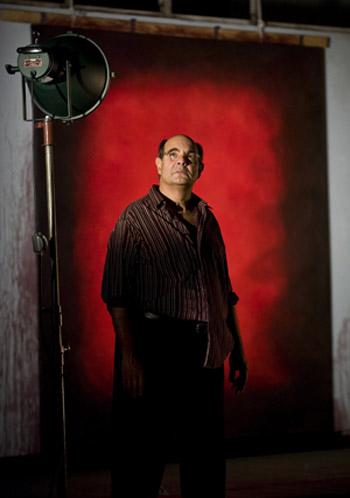How to Be Mark Rothko
By • May 3, 2012 0 1197

On a windy, cold Friday night in Southwest Washington, a mostly bald middle-aged man and a young, wiry, slight younger man came out of the Arena Stage doors, dwarfed by the glass and wood edifice. Watching them from a distance they were like longtime friends, coming off from a long day’s work, walking within the halo of a weary and mutual satisfaction.
The two men were the actors Edward Gero and Patrick Andrews, who had spent the latter part of the night battling back and forth as the American abstract expressionist painter Mark Rothko and a fictionalized young assistant. They yelled at each other, splattering red paint, arguing passionately about art and life in the play “Red,” in what often seems like a life-or-death struggle before an appreciative audience. I couldn’t hear what they were saying and soon their voices receded and they moved from view.
But their voices stayed with me nonetheless, and sometimes I hear them still—the debates about art, the volatility of passionate gobs of words amid flying gobs of paint.
“Yeah, it’s a little like that,” said Gero over coffee at Politics and Prose a few days later. “We’re close, we’re friends. We’ve been doing this a while now, here and in the Goodman Theatre run in Chicago.”
“But it’s still surprising. It’s still remarkably challenging to do this for both of us, and we’re still learning about each other.” Gero said. “Every night is a new experience with theater, but that’s rarely as true as it is in this play. It’s even more true now that we’re here at Arena. Here the audience is in the studio practically, because of the intimacy of the space, which really raises the level of intensity. And with a show like this, it can be exhausting.”
“One night I kicked a bucket of paint over accidentally,” Gero recalled.
When I asked him how he handled the situation onstage he said: “What Rothko would have done. I told him to clean it up.” You think—and more importantly, feel—that this happened, these feelings were expressed, the words unleashed.
And when Rothko and Ken grab paint brushes and buckets and commence to apply a load of red base paint on a mighty blank canvas, tossing paint around like giant swaths of wet spitballs, moving over and under one another, it’s thrilling. You get a real sense of the physicality of the creative process.
“The whole thing is choreographed,” Gero said. “But it’s never the same, it’s tricky, it’s tough, it’s musical and exhausting, it’s sexual. It was my idea to smoke the cigarette afterwards. People get it right away, it’s like a punctuation.”
What the intimacy of Arena’s Kreeger theater creates is a kind of stillness and respect in the audience, because you believe in the reality of the people—and how can you not, with the red and black battling on the canvases, with the elevated, painful verbal arguments.
Not to mention, Washington is something of a Rothko town: the National Gallery installed the Seagram murals in 2010 that figure so strongly in the art-commerce battles of the play, and the Phillips Collection has their famous Rothko room, designed by the actual artist himself to facilitate his meditative, tragic and aggressive paintings.
One of the reasons that Washington is such a great theater town is actors like Gero, who has worked almost nonstop for decades in most of the area’s venues, from the Shakespeare Theatre Company—where he’s been a company mainstay—to Arena, Ford’s, Studio and a host of others. Gero joins a thespian host that includes the likes of Ted van Gruythiesen, Nancy Robinette, Holly Twyford, Rick Foucheoux and others, who have all scaled the heights in DC theater with uncommon versatility and talent over the years.
“It is not easy, but it’s what I love,” he says. “My wife has been an elementary and special education teacher in the DC School District and it’s her love, too. You have to have something you love to do in addition to the family you love, the people you love.”
Family is central in his life. Upon winning a Helen Hayes Award for playing Bolingbroke in “Richard II”—he’s won four Helen Hayes Awards and been nominated 14 times—he dedicated the award to “my father, Sal of Jersey,” in reference to the show’s aging father figure, John of Gaunt. “My dad had passed away that year,” Gero recalled.
“I’ve got nothing on the plate after this right now, which is unusual,” he said. “But I’d love to do ‘Waiting for Godot’ with Stacey Keach somewhere down the line.”
Somewhere, down the line, you suspect he’ll also be visiting the Rothko Room at the Phillips, and spot a daub of red in some shirt he’s wearing.
“Red” has been extended through March 11 at Arena Stage. For more information visit ArenaStage.org

